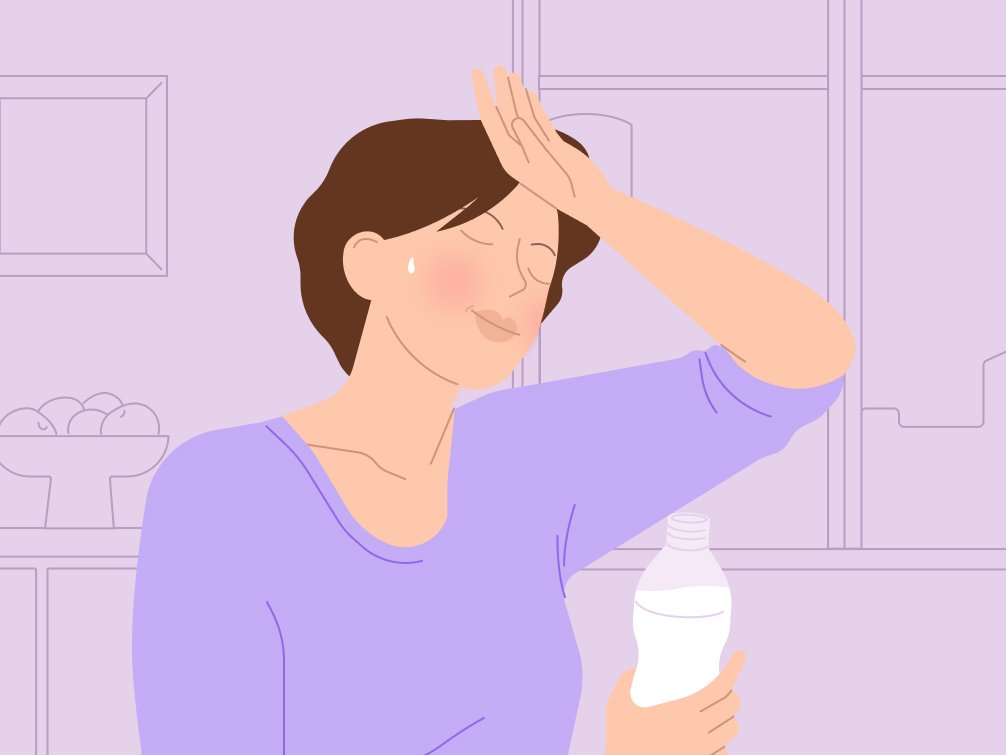Have you ever been going about your day when, all of a sudden, a surge of heat overtakes your body, your face flushes, and you start to sweat? That sudden wave, often called a hot flash, is a common symptom many people—especially women approaching menopause—experience. While it’s easy to dismiss as “just a part of aging,” hot flashes can be disruptive and uncomfortable, and they may even signal underlying health concerns.
This guide dives into everything you need to know about hot flashes—what causes them, why they happen, and the best strategies to manage or prevent them. Whether you’re just starting to experience symptoms or have been battling them for a while, you’ll find helpful insights and practical solutions here.
Also read: Progesterone Supplements During Pregnancy: How They Help Support a Healthy Baby
What are Hot Flashes?
A hot flash is a sudden and intense sensation of heat that usually begins in the upper body, particularly the chest, neck, and face. It may be accompanied by redness (flushing), sweating, and sometimes chills afterward. These episodes can last from a few seconds to several minutes, and they can occur multiple times a day—or during the night, leading to what are commonly referred to as night sweats.
While hot flashes are most well-known as a symptom of menopause, they can also arise from other causes unrelated to hormonal changes.
What Causes Hot Flashes?
Hot flashes are usually tied to the body’s regulation of temperature, which is influenced by hormones. When this system becomes imbalanced—due to menopause, medications, or medical conditions—your body may mistakenly think it’s overheating, prompting it to cool down by increasing blood flow and sweat production.
Let’s explore the common triggers and causes:
1. Hormonal Shifts (Menopause and Perimenopause)
The most frequent cause of hot flashes is the natural decline in estrogen that occurs during menopause and its lead-up phase, known as perimenopause. Estrogen plays a key role in maintaining the brain’s temperature regulation system. As levels drop, the hypothalamus (your body’s internal thermostat) becomes more sensitive to minor temperature shifts, often triggering a hot flash response unnecessarily.
Women may start noticing these symptoms in their 40s, with some continuing to experience them into their 60s.
2. Underlying Medical Issues
Certain health conditions can also lead to hot flashes or similar symptoms:
- Hyperthyroidism (overactive thyroid): Increases metabolism and body heat
- Infections or fevers: Often come with sudden waves of heat and sweating
- Cancer treatments: Especially therapies for breast or prostate cancer
- Diabetes: Blood sugar fluctuations can sometimes mimic hot flashes
If you’re experiencing hot flashes without the usual menopausal context, it’s important to get checked for these possibilities.
3. Medications
Several prescription drugs list hot flashes as a side effect. These include:
- Antidepressants, particularly selective serotonin reuptake inhibitors (SSRIs)
- Opioid pain relievers
- Hormone-blocking treatments used in cancer care (e.g., tamoxifen)
- Steroids
Always review medication side effects with your doctor, especially if new symptoms develop after starting a treatment.
4. Everyday Triggers
Certain foods and habits can set off or worsen hot flashes. These include:
- Hot beverages or spicy foods
- Caffeine and alcohol
- Tobacco use
- Stress and anxiety
- Warm environments or overheating
Keeping a symptom diary can help identify your personal hot flash triggers and make them easier to avoid.
Signs and Symptoms of Hot Flashes
Though the main feature is a feeling of intense warmth, hot flashes often come with other signs:
- Flushed skin, especially on the face and chest
- Sweating, which may be light or profuse
- Heart palpitations or rapid heartbeat
- Chills or cold sensation following the flash
- Tingling in the fingers
- A sense of panic or anxiety
In some individuals, hot flashes can occur so frequently that they disrupt daily life and sleep, making it harder to focus, stay calm, or feel well-rested.
Diagnosing the Cause of Hot Flashes
To understand what’s triggering your hot flashes, a healthcare provider may perform:
- Hormone tests to check estrogen, FSH (follicle-stimulating hormone), and others
- Thyroid function tests
- Blood glucose tests
- A thorough medical history and symptom review
These assessments help determine whether menopause, a medication, or an underlying illness is behind your symptoms.
Effective Treatments for Hot Flashes
There’s no one-size-fits-all remedy for hot flashes, but a variety of treatments—both medical and natural—can offer relief. The best approach often depends on your age, health status, and the severity of your symptoms.
1. Hormone Replacement Therapy (HRT)
HRT involves taking estrogen (sometimes combined with progesterone) to balance hormone levels and reduce the symptoms
. It is considered the most effective treatment for menopausal symptoms.
However, HRT isn’t for everyone. People with a history of breast cancer, blood clots, or heart issues may be advised against using it. It’s crucial to consult a healthcare provider to assess the benefits and risks for your individual case.
2. Non-Hormonal Medications
Several medications that don’t involve hormones have been shown to reduce hot flashes:
- Low-dose antidepressants (such as venlafaxine or paroxetine)
- Gabapentin: An anti-seizure drug that also helps with nighttime hot flashes
- Clonidine: Originally for blood pressure, it may offer some relief
These alternatives are often recommended when hormone therapy isn’t suitable.
3. Natural and Herbal Options
Many individuals turn to herbal remedies to ease hot flashes, although research on their effectiveness varies. Some commonly explored plant-based options include:
- Black cohosh
- Soy isoflavones (commonly found in soy-based foods like tofu and soy milk)
- Red clover and dong quai
While these herbal supplements are popular, it’s important to understand they may interact with medications or pose risks for those with hormone-sensitive conditions. For safety, always speak with your doctor before incorporating any herbal products into your daily regimen.
4. Lifestyle Changes That Can Help
Simple adjustments to your everyday habits can have a big impact on how often and how intensely hot flashes occur. Consider these helpful strategies:
- Wear clothing in layers so it’s easier to cool down
- Use a fan or portable air cooler to stay comfortable
- Keep indoor spaces well-ventilated and at a moderate temperature
- Steer clear of food and beverages that trigger symptoms
- Drink plenty of cold water throughout the day
- Include regular physical exercise in your routine
- Work toward achieving and maintaining a healthy weight
Even small shifts—like using breathable bedding or investing in a cooling pillow—can offer meaningful relief.
5. Mind-Body Approaches
Emotional stress and anxiety can make hot flashes worse. Incorporating relaxation and mindfulness practices into your life may help manage symptoms more effectively. Consider trying:
- Deep breathing techniques
- Meditation and yoga
- Acupuncture sessions
- Cognitive Behavioral Therapy (CBT)
CBT, in particular, has shown positive results in helping women cope with hot flashes and improve their day-to-day well-being.
Tips for Managing Night Sweats
Hot flashes that occur during sleep—often called night sweats—can disrupt your rest and leave you drained the next day. These tips can help improve nighttime comfort:
- Choose lightweight, moisture-wicking sleepwear
- Use a cooling pillow or mattress topper
- Keep a fan or air conditioning running through the night
- Avoid spicy food and alcohol before going to bed
- Establish a calming bedtime routine to relax the mind and body
Frequent nighttime disruptions can affect mood, energy, and overall wellness, so it’s essential to take steps to sleep better and manage these symptoms effectively.
When to Seek Medical Advice
Although hot flashes are commonly linked to menopause, there are times when they warrant a closer look from a healthcare professional. You should consult your doctor if:
- Your symptoms begin unexpectedly and don’t align with hormonal changes
- You’re also experiencing weight loss, extreme fatigue, or abnormal bleeding
- The hot flashes are especially severe or happening very frequently
- Your sleep, mental health, or ability to function is being negatively affected
A medical evaluation can help identify the cause and determine the safest and most effective treatment plan for your specific needs.
Wrapping Up
Hot flashes can do more than just make you feel warm—they can interfere with your comfort, confidence, and quality of life. Fortunately, with a combination of knowledge, medical support, and lifestyle strategies, you can take control of these symptoms.
Remember, there’s no universal solution. Each person’s experience with hot flashes is unique. The best approach is one tailored to your body and your circumstances, built in partnership with a trusted healthcare provider.





[…] Also read: Hot Flashes in menopause Causes and Treatments […]